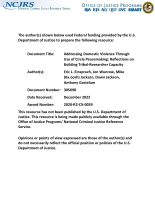Restorative justice
SNPs for Individual Identification
Incapacitated, Forcible, and Drug/Alcohol-Facilitated Rape in Relation to Binge Drinking, Marijuana Use, and Illicit Drug Use: A National Survey
Identification of smartphone-image source and manipulation
A gonosomal marker multiplex to aid in mixture interpretation
Forcible, Drug-Facilitated, and Incapacitated Rape in Relation to Substance Use Problems: Results from a National Sample of College Women
An efficient clustering-based retrieval framework for real crime scene footwear marks
Application of the scientific method to skeletal biology
Restorative Community Justice: Background, Program Examples, and Research Findings
Restorative Justice: Friend or Foe?
Impact Evaluation of Complementarities Between PBIS and Restorative Justice
Heal Our Youth: A Mixed Methods, Hybrid Effectiveness Implementation Trial for Reducing Community Violence Among Youth in Limited-Opportunity Settings
Redesigning Life in U.S. Prisons
The prison system in the U.S. typically places a heavy emphasis on security, control, and punishment, and this foundation can create an adversarial culture within correctional facilities — incarcerated individuals versus correctional staff. But what if that culture could change? What would it look like? How would it impact not only incarcerated individuals but also correctional officers and other staff?
Transforming Correctional Culture and Climate
Group Work in Research: Creating a Research Family
Addressing Domestic Violence Through Use of Circle Peacemaking: Reflections on Building Tribal-Researcher Capacity
National Scan, Case Studies, and Evaluability Assessments of Restorative Justice Programs for Serious and Violent Harm
Cultivating Healing by Implementing Restorative Practices for Youth: Protocol for a Cluster Randomized Trial
The North Carolina Youth Violence Prevention Center: Using a Multifaceted, Ecological Approach to Reduce Youth Violence in Impoverished, Rural Areas
The Science of School Safety
Gun violence may be the most discussed topic surrounding school safety, but it is by no means the only one. Bullying, school climate, and mental health affect students across the country, and are some of the many other issues that NIJ researches. Mary Poulin Carlton, an NIJ social science analyst, joins host Paul Haskins to discuss these and other important school safety issues.
Reading and Resources from the National Institute of Justice:








